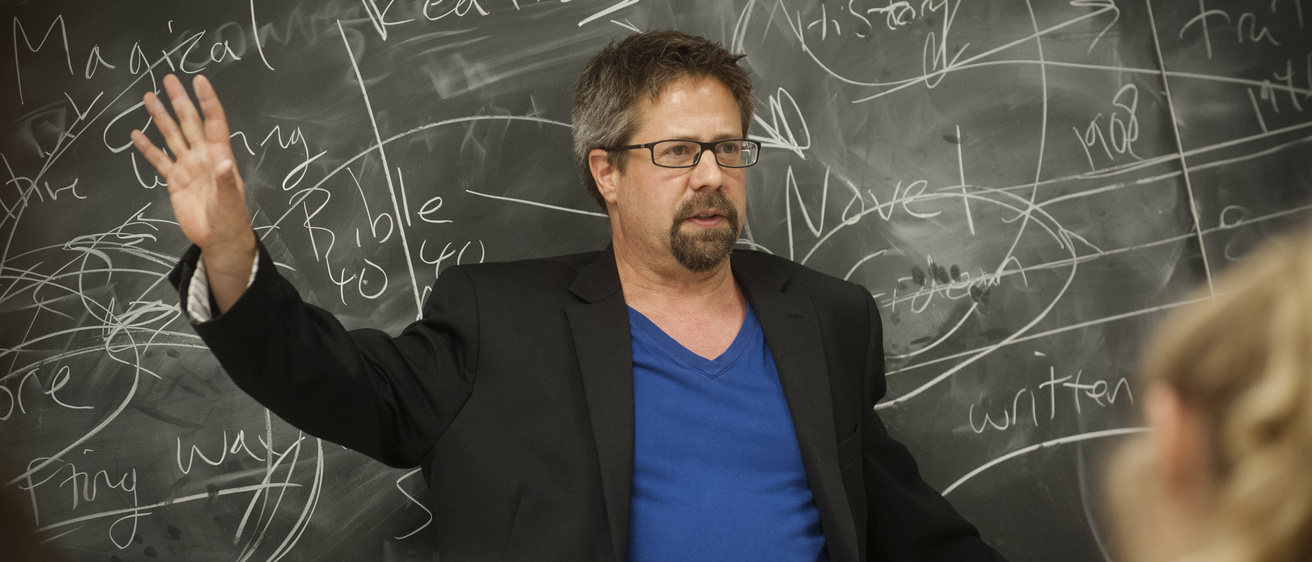Main navigation
Earn your BA in English
Reading for fulfillment. Reading for success.
The Bachelor of Arts in English major offers students the foundations of close reading, formal analysis, literary history, critical theory, research strategies, and rigorous, respectful debate. We train students to discuss and write critically about the ways literature and language have profoundly influenced the values and lived experiences of societies over centuries and across geographical boundaries.
When Iowa English majors head out into the world, we expect that they will carry with them a passion for reading, a commitment to use language self-consciously and ethically, and a readiness to embrace the new experiences that wide reading encourages. We believe the education our majors gain as readers and writers will be invaluable whether they work in education, the arts, business, the nonprofit sector, government, or in other careers. We also believe that lifelong engagement with literature is one of our best hopes for the critical thinking, compassion, inspiration, and action that are crucial to a just society and global community.
To get more involved with fellow majors - including events like open mics, English Society meetings, and more – check out the Student Organizations page.
Requirements
The BA in English requires a minimum of 120 semester hours (s.h.), including at least 36 s.h. (usually 12 courses) of work for the major. Students must maintain a GPA of at least 2.00 in all courses for the major and in all UI courses for the major. They also must complete the College of Liberal Arts and Sciences GE CLAS Core.
Students must earn at least 21 s.h. of credit for the major at the University of Iowa. Transfer students may count a maximum of 15 s.h. of approved transfer credit toward the major.
For more specific information on courses, curriculum, and requirements of the Bachelor of Arts in English, visit the UI General Catalog.
Learning outcomes
The goal is for students who graduate from the Department of English to demonstrate the skills of reflective reading, critical and creative thinking, compelling writing, and engaged citizenship.
Reflective readers
- Analyze literary and cultural texts through close reading.
- Gain broad knowledge of several fields of literature.
- Grasp formal elements of key literary genres.
- Learn to read comparatively to illuminate aesthetic, social, and cultural contributions of texts.
Critical and creative thinkers
- Approach texts with a spirit of critical inquiry and flexibility.
- Formulate productive questions.
- Use textual evidence to support individual interpretations.
- Draw upon several different critical approaches to literature in English.
- Effective Speakers
- Express opinions about the texts they read through discussion and written assignments.
- Listen respectfully to others’ opinions.
- Work in class—whether through active listening or discussion—to learn by synthesizing a range of texts, insights, and opinions.
Compelling writers
- Express themselves in clear, fluent, and lively writing.
- Organize their ideas effectively.
- Use textual evidence to illustrate and support their insights and arguments.
- Are able to write in different modes appropriate to varied genres and aesthetic traditions.
- Engage properly with relevant scholarship and creative work.
- Use research skills that include an understanding of methods, craft, technology, and conventions.
- Demonstrate the ability to create in modes that are appropriate to various genres.
Engaged world citizens
- Communicate respect and understanding for the literatures and cultures of diverse historical periods, geographical regions, and cultures.
- Explore ethical issues raised by literature.
- Practice collaborative and ethical literary citizenship.
- Reflect on the ways that literature addresses issues of social justice.
- Use reading, speaking, and writing skills to engage with the ethical concerns raised by literature in their daily and professional lives.
Create your academic path
You'll find degree overviews, requirements, course lists, academic plans, and more to help you plan your education and explore your possibilities.
Current course list
The MyUI Schedule displays registered courses for a particular session and is available to enrolled students. The list view includes course instructors, time and location, and features to drop courses or change sections.
